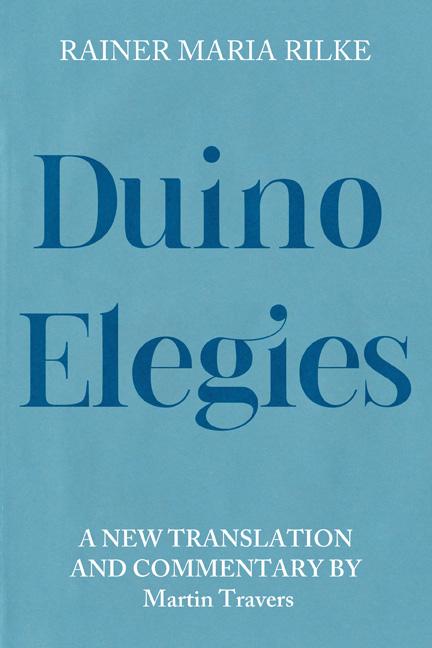Elegy 10
Published online by Cambridge University Press: 10 January 2024
Summary
The tenth Elegy opens with one final expressive outpouring from the lyrical subject, an outpouring that returns us to the pained subjectivity of Elegy 1. What follows has been described as a “topographical allegory” (Crucefix, 101), where the lyrical “I” of the first Elegy is sublimated into a non-lyrical “I” of this Elegy, in a narrative of increasing ethereality. The poem moves from the topos of the city to the ultimate topos, “the broad landscape / of the Laments.” The former is a place of easy amusement and false idols; the latter offers the quiet transfiguration of the spirit, as it extols the superiority of pain over false consolations, material and religious. A young man appears and falls in love with an enigmatic female simply called “Lament” (“Klage”). In a poem that possesses a rare narrative in the Elegies, physical love, which does not take place, is replaced by a spiritual love, which does, as young Lament gives way to an older Lament. She leads the youth, now refashioned as the young-dead, through a terrain attenuated and sepulchral, and where the distinctions between knowledge and death, the living and the dead, no longer exist.
Daß ich dereinst, an dem Ausgang der grimmigen Einsicht,
Jubel und Ruhm aufsinge zustimmenden Engeln.
Daß von den klar geschlagenen Hämmern des Herzens
keiner versage an weichen, zweifelnden oder
reißenden Saiten. Daß mich mein strömendes Antlitz
glänzender mache; daß das unscheinbare Weinen
blühe. O wie werdet ihr dann, Nächte, mir lieb sein,
gehärmte. Daß ich euch knieender nicht, untröstliche Schwestern,
hinnahm, nicht in euer gelöstes
Haar mich gelöster ergab. Wir, Vergeuder der Schmerzen.
Wie wir sie absehn voraus, in die traurige Dauer,
ob sie nicht enden vielleicht. Sie aber sind ja
unser winterwähriges Laub, unser dunkeles Sinngrün,
eine der Zeiten des heimlichen Jahres—, nicht nur
Zeit—, sind Stelle, Siedelung, Lager, Boden, Wohnort.
Freilich, wehe, wie fremd sind die Gassen der Leid—Stadt,
wo in der falschen, aus Übertönung gemachten
Stille, stark, aus der Gußform des Leeren der Ausguß
prahlt: der vergoldete Lärm, das platzende Denkmal.
O, wie spurlos zerträte ein Engel ihnen den Trostmarkt,
den die Kirche begrenzt, ihre fertig gekaufte:
reinlich und zu und enttäuscht wie ein Postamt am Sonntag.
- Type
- Chapter
- Information
- Duino ElegiesA New Translation and Commentary, pp. 273 - 302Publisher: Boydell & BrewerPrint publication year: 2023



